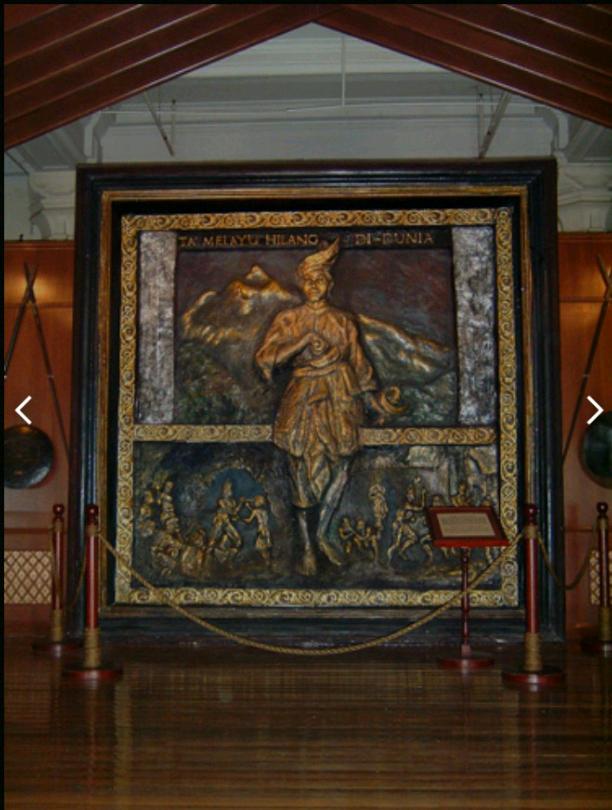
Man's World
Read Count : 343
Category : Blogs
Sub Category : World
When it comes to love and loyalty, how easy or difficult is it to show one's integrity?
In the 15th century during the reign of Sultan Mansur Shah in Malacca; located in the southern region of Peninsula Malaysia which has been dubbed "The Historic State", there lived a warrior by the name of Hang Tuah. He was supposedly the most powerful of all the laksamana (Admirals), and is considered till today, by the Malays, to be one of history's greatest silat (Malay Martial arts) masters. Hang Tuah is held in the highest regard, even in present-day Malay culture, and is arguably the most well-known and illustrious warrior figure in Malay history and culture.
As a young boy, Hang Tuah worked as a woodcutter in his parent's shop. His grasp of spiritual concepts and potential as a fighter were apparent from a young age. At the very young age of ten years old he learned silat together with his four comrades; Hang Kasturi, Hang Jebat, Hang Lekir, and Hang Lekiu, from their teacher, Adi Putera, a renowned master who lived a hermetic life at the top of a mountain. Under the guru's tutelage, Hang Tuah and his four compatriots were taught the arts of self-defense and meditation.
Hang Tuah's appearance in the history of the region began when some men ran amok near Kampung Bendahara. Tun Perak, who was the Bendahara (a Malay rank similar to a Prime Minister of the Sultanate of Malacca) came with a party of guards to investigate the incident, but they were also attacked. Tun Perak's guards fled but when Hang Tuah and his friends who happened to be nearby saw what was happening, they rushed to save Tun Perak. They fought the group of men and because of their ferociousness, the men ran away. Tun Perak was amazed by the courage of Hang Tuah and his companions that he rewarded them and presented them to the Sultan.
Hang Tuah became the Sultan's constant aide and throughout his career as a laksamana, he showed unfaltering loyalty to his Sultan. Part of his job required him to accompany the Sultan on official visits to foreign countries, and on one such visit to Majapahit (a Javanese Hindu-Buddhist thalassocratic empire in South East Asia, based on the island of Java; part of modern day Indonesia), Hang Tuah fought a duel with the famed pendekar (master of swordsmanship or martial arts) named Pendekar Taming Sari. After a brutal fight, Hang Tuah emerged as winner and the ruler of Majapahit bestowed upon him Taming Sari's Keris (Malay dagger). The Keris Taming Sari was named after its original owner, and was purported to be magical, empowering its owner with physical invulnerability.
Hang Tuah also acted as the Sultan's ambassador, travelling on the Sultan's behalf to allied countries for official matters. One story concerning Hang Tuah's legendary loyalty to the ruler involved his visit to Inderaputra (presently known as Pahang), where the Sultan had sent him with the task to persuade the Princess Tun Teja, who was already engaged, to become the Sultan's companion. Tun Teja was smitten by Hang Tuah and fell under the impression that Hang Tuah had come to persuade her to marry him, not the Sultan, and she agreed to elope with him to Malacca. Hang Tuah led her to believe that was the case and it was only during the voyage home that he revealed his deception to the Princess.
Perhaps the most famous story in history is the fight between Hang Tuah and his childhood companion, Hang Jebat. Hang Tuah's loyalty to and his popularity with the Sultan led to rumours being circulated that he was having an illicit affair with one of the Sultan's dayang (court stewardesses). The Sultan then sentenced Hang Tuah to death without trial for the alleged offence. However, the death sentence was never carried out because Hang Tuah's executioner, the Bendahara, went against the Sultan's order and hid him in a remote region of Malacca.
Believing that Hang Tuah was dead, murdered unjustly by the Sultan he served, Hang Jebat decided to avenge his friend's death. Hang Jebat's revenge allegedly became a palace killing spree of furious rebellion against the Sultan. Hang Jebat wreaked havoc onto the Royal Court, and the Sultan was unable to stop him as none of the warriors dared to challenge the more ferocious and skilled Hang Jebat. Seeing how things have gotten out of hand, the Bendahara came clean and informed the Sultan that the only man who was able to stop Hang Jebat was Hang Tuah, and that he was still alive. The Bendahara recalled Hang Tuah from his hiding place and he was given full amnesty by the Sultan and was instructed to kill Hang Jebat. Hang Tuah felt torn. On one hand there was his deep loyalty towards his Sultan, and on the other hand, there was his deep love for his childhood friend. In the end, he chose his loyalty for his Sultan and faced to fight his childhood companion who was equally ferocious and skillful as he. After seven gruelling days of fighting, Hang Tuah was able to kill Hang Jebat.
Hang Tuah continued to serve Malacca after the death of Hang Jebat. Later in his life, as Hang Tuah progressed in his years, the warrior was ordered by the successive Malaccan ruler to court a legendary princess on the Sultan's behalf. The princess that the Sultan had his eyes on was Puteri Gunung Ledang (Princess of Mount Ledang) who resided on Mount Ledang, at the Malacca-Johor border. According to legend, the Princess met with Hang Tuah and only agreed to marry the Sultan if he (the Sultan) satisfied a list of requirements or pre-wedding gifts of her demand. The list included a golden bridge linking Malacca with the top of Mount Ledang, seven trays of mosquito livers, seven jars of virgins' tears, and a bowl of the Sultan's first-born son's blood. Hang Tuah knew the tasks would not be fulfilled and was said to be so overwhelmed that he failed his King that he flung his Taming Sari Keris into a river and vowed to only return to Malacca if it resurfaced, which it never did. It was also said that he then vanished into thin air. According to other sources, Hang Tuah lived to an old age, and his body is said to have been buried in Tanjung Kling in Malacca, where his tomb can still be seen today.
Centuries later, Hang Tuah remains extremely popular in Malaysia, embodying the values of upper-class Malay culture at the time when allegiance and loyalty to the ruler were paramount above all else. Although its historical accuracy remains disputable, the legend of the tragic friendship between Hang Tuah and Hang Jebat represents a paradox in the Malay psyche about loyalty and justice, and remains a point of debate among students of Malay history and literature.




